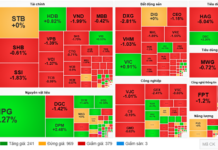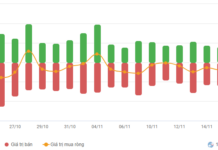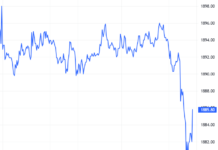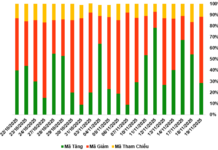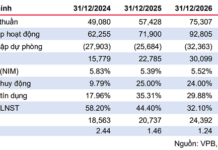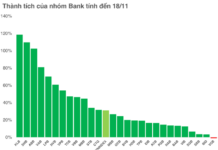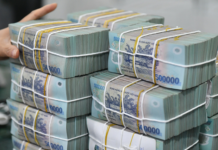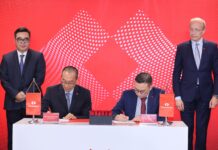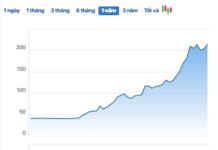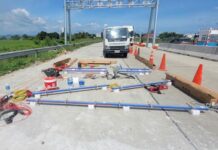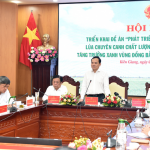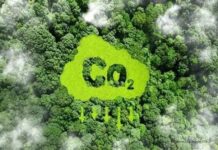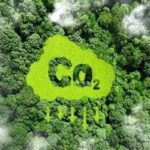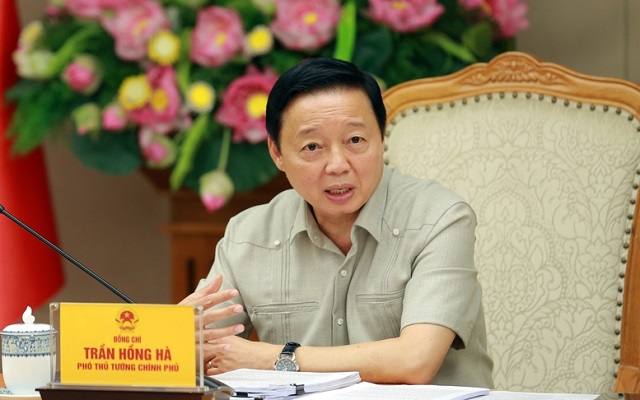
Deputy Prime Minister Tran Hong Ha emphasizes the need for flexible, creative, and breakthrough solutions in implementing the Proposal for Developing Vietnam’s Carbon Market – Photo: VGP/Minh Khoi
|
According to the latest draft, the carbon market will create a new stream of finance for greenhouse gas emission reduction activities, promote green transformation, develop low-emission technologies, foster a low-carbon economy, and proactively respond to climate change, aiming for net-zero emissions by 2050.
From 2025 to 2028, the carbon market will be piloted nationwide; carbon credits will not be sold internationally; and there will be no regulations on connecting or exchanging domestic carbon credits with regional and global carbon markets.
All emission allowances will be allocated for free, and there will be no auctions. Emission allowances will be distributed to major emitting sectors.
The types of carbon credits permitted for trading on the market include those obtained from domestic programs or projects that generate credits in accordance with domestic laws and international programs or projects that follow the mechanism of exchanging and offsetting international carbon credits.
The buyers and sellers in the market are large greenhouse gas-emitting facilities in sectors determined by the Prime Minister, which are allocated emission allowances, and organizations or individuals participating in the buying and selling of carbon credits on the exchange.
Starting in 2029, the carbon market will be officially operated nationwide, with continued development and improvement of laws and infrastructure to facilitate the connection between the domestic carbon market and regional and global carbon markets.
Most greenhouse gas emission allowances will be allocated for free, with the remaining portion allocated through auctions. Additional types of verified carbon credits will be considered for trading on the market.
The entities participating in the emission allowance trading are facilities that emit greenhouse gases and are listed in the greenhouse gas inventory directory issued by the Prime Minister.
The entities participating in carbon credit trading are organizations implementing domestic programs or projects that generate carbon credits or implementing international programs or projects that follow the mechanism of exchanging and offsetting international carbon credits, in accordance with domestic laws and international treaties to which Vietnam is a signatory. They also include organizations and individuals eligible to engage in investing and trading carbon credits.
Supporting organizations for trading are entities that conduct greenhouse gas emission reduction verification. Depending on the expected market scale, it may include organizations performing other trading support tasks.
The trading of emission allowances and carbon credits will be conducted on a domestic carbon credit exchange through a centralized online trading platform.
The domestic carbon market is a compliance market. The Ministry of Natural Resources and Environment is responsible for operating, managing, monitoring, and supervising the carbon credit market.
Hanoi Stock Exchange (HNX) and Vietnam Securities Depository and Settlement Corporation are responsible for developing and providing services for the domestic carbon credit exchange, following the business requirements for organizing and managing the market, as well as the conditions and technical standards set by the Ministry of Natural Resources and Environment.
At the meeting, delegates discussed and analyzed the addition of functions and tasks for HNX in providing quota and carbon credit trading services, the coordination between the Ministry of Natural Resources and Environment and the Ministry of Finance in organizing the operation, management, monitoring, and supervision of the carbon market, the plan for connecting and participating in the domestic and global carbon markets, and preventing speculation.
Concluding the meeting, Deputy Prime Minister Tran Hong Ha emphasized that with its vast potential in renewable energy and the carbon market, Vietnam will be highly attractive to investors. Therefore, we need flexible, creative, and breakthrough solutions in implementing the Proposal to catch up with global trends.
“This is a race where the fastest wins, and those who are smart will seize and utilize the opportunity to catch up and even surpass others,” said the Deputy Prime Minister.
The Deputy Prime Minister requested the Ministry of Finance to study and thoroughly absorb the contributions, urgently complete the Proposal not only for the carbon market but also for the organizational apparatus and infrastructure…
By Nhat Quang
Project “Quality High-Yield Rice Cultivation” – The Big Game and the 10 Principles
On the morning of January 5th, in Kiên Giang province, Deputy Prime Minister Trần Lưu Quang presided over a conference to implement the Sustainable Development Project for 1 million hectares of high-quality, low-emission rice cultivation linked to green growth in the Mekong Delta region by 2030.
Low-carbon economic development: The “must-haves” for achieving a circular economy.
With a commitment to achieving net-zero emissions in Vietnam by 2050 and a commitment to combating deforestation in accordance with the EU Forest Law Enforcement, Governance and Trade (FLEGT) regulations by the end of 2024, we aim to move towards a low-carbon economy, paving the way for circular economic development for businesses.
Businesses Lack Understanding of ETS and Carbon Market
Only 57.38% of businesses are currently preparing to build a greenhouse gas emission reduction plan, nearly 28% already have a greenhouse gas emission reduction plan, over 50% of businesses have heard of ETS and the carbon market but are not familiar with the basic operating principles, only 1.27% of businesses understand how ETS and the carbon market work…
Ho Chi Minh City offers unique advantages for developing the voluntary carbon credit market
The voluntary carbon market is considered to be one of the key tools in ensuring the fulfillment of commitments in reducing greenhouse gas emissions by 45% by 2030 and achieving net-zero emissions by 2050. Participating in the voluntary carbon credit market presents numerous opportunities and challenges for Ho Chi Minh City.

